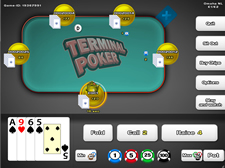Connected Table's TerminalPoker bridges the gap between slots and automated poker. The company's Per Hildebrand explains how

No longer a niche product, automated poker can be found in its many guises on gaming floors throughout the world. It is a category of games that is appealing to both operators and players for a variety of reasons, most notably because games are relatively inexpensive to run, wagers and payouts are dealt with electronically and often they are less intimidating than live tables. The impression given by forward-looking operators is that automated poker is also a gateway to attracting internet poker players to bricks and mortar casinos.
There are a multitude of automated poker products out there, developed by an equally large number of manufacturers and software designers. Among these is Connected Table, which started out as a manufacturer of digital poker tables and has now made the transition to software design.
“As the market for digital tables never really took off, we saw great potential in distributing the poker software to all kinds of devices,” said chairman Per Hildebrand. “We are now focusing on software development and connecting online and offline operators to our poker network. By making our poker products compatible with hardware supplied by many different manufacturers, we now have a great opportunity to quickly grow the poker network.”
Central to this strategy is TerminalPoker, a product that differs from traditional poker as players rather than taking a seat at the table, actually join a pool. Once there, they are automatically seated at a table and a hand starts as soon as there are enough players at the table, normally within seconds. When a player folds or the hand is finished, he or she is instantly placed at a new table and dealt a new hand.
“The high speed of the game together with the customisation for touchscreens makes our poker extremely suitable for play in all kinds of terminals and gaming machines, not to mention smartphones and tablet computers,” Hildebrand explained.
TerminalPoker is powered by the company's own InstaDeal software and is based on the InstaDeal Poker Network. “TerminalPoker is connected to the network meaning that terminal operators can benefit from the shared liquidity in the poker networks so that players can always find the games they like.”
Hildebrand believes TerminalPoker is perhaps closer to traditional slot machines than other automated poker products out there and is confident that it will prove to be a great success.
“As TerminalPoker generates much more revenue per hour than normal online poker, it will be easier for operators to earn money from their machines and we also think that it will help attract customers to bars and clubs,” he said. “It can be offered on all kinds of server-based gaming machines. This means that with one relatively simple integration, a terminal operator can distribute TerminalPoker to all their gaming machines.”
The platform is also user-friendly and, because of its speed, likely to attract all skill levels. The more skilled players are expected to enjoy the pace of the game, while novice players are protected from becoming “easy pickings."
Said Hildebrand: “User experience is always the key. We are dedicated to providing a simple and intuitive product that players can enjoy without being experts.”
Here is where the distribution of the product is key.
“If you can play poker in a nice way from your phone or tablet computer or put in €10 in a machine in a bar and play a few hands and make a cash-out if you are lucky, that will really hit the mass market.”
Poker has become a social game, so will a slot machine-style game be as successful as other automated products? Hildebrand suggests that the social element of online gaming is merely a by-product of a slower system.
“Everybody likes a lot of action when playing games and the social side of digital poker - where players chat with each other - is mainly due to players spending their time waiting at the table,” he said. “With TerminalPoker, there is no waiting time and players change all the time so we believe that the need for socialising is very limited. It is just another format of the game, offering non-stop play. Players will be interacting within a social setting rather than through the product they are playing.”
The ultimate aim is to see automated poker products, such as TerminalPoker, supplement a casino's slot machines. Multiplayer products, said Hildebrand, will be less profitable for operators than slots but will attract a new type of customer and keep them coming back to the venue.
As a developer of the software platform as well, Connected Table is well placed to meet the changing needs of players.
“We also think that tablet computers will be popular for gaming in pubs and clubs,” Hildebrand added. “The venues will hook up with some operators that sponsor the devices and a user could borrow a personal gaming device in a bar. This would allow for people in a pub to play a multi-table poker tournament against each other or perhaps in a network of pubs.
“Obviously this future development will depend on local legislation but wherever there is a multiplayer poker machine we are sure there will be a lot of interest to play.”

